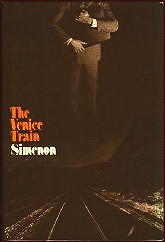Thu 19 Jul 2012
A 1001 MIDNIGHTS Review: GEORGES SIMENON – The Venice Train.
Posted by Steve under 1001 Midnights , Reviews[3] Comments
by George Kelley & Bill Pronzini
GEORGES SIMENON – The Venice Train. Harcourt Brace Jovanovich, US, hardcover, 1974. Hamish Hamilton, UK, hardcover, 1974. Translation of Le Train de Venise, Paris, 1965.

Justin Calmar is an ordinary man; everything in his life seems well ordered and complacent. Then he takes his family on a vacation to Europe, and on the train from Venice to Paris a stranger approaches and asks him to deliver an attache case.
Calmar agrees. But when he enters the Paris apartment where he is supposed to make the delivery, he finds a murdered woman. Panicked, he flees — and his life is forever altered.
Fear and paranoia take control of Calmar. He becomes obsessed with the attache case and the events surrounding the bizarre affair. He hungrily reads newspapers looking for clues to the stranger’s identity, and finds that the man, too, has been murdered. Will he be next?
When Calmar finally opens the attache case, he finds bundles of American hundred-dollar bills, English fifty-pound notes, and Swiss francs: a literal fortune. But this only deepens his fear: Someone win surely come to take the money away from him.
He embarks on a frantic routine to keep the case hidden, continually shifting it from train-station lockers to bus-station lockers and back again. His existence degenerates into a nightmare of anxiety, depression, and continued paranoid behavior — he is a man at the breaking point long before anything happens to substantiate his terror.
Few writers can match Simenon when it comes to the novel of psychological suspense, and this is one of his finest books of this type. Justin Calmar is a memorable and tragic character; and Simenon’s theme is powerfully stated. Relentless though it may be, The Venice Train is a novel for our time, with implications that transcend its simple plot and a message for us all.
Outstanding among Simenon’s many other novels of psychological suspense are The Man Who Watched the Trains Go By (1946), Act of Passion (1953), In Case of Emergency (1958; made into an excellent French film with Brigitte Bardot and Jean Gabin), and The Innocents (1974).
———
Reprinted with permission from 1001 Midnights, edited by Bill Pronzini & Marcia Muller and published by The Battered Silicon Dispatch Box, 2007. Copyright © 1986, 2007 by the Pronzini-Muller Family Trust.
July 20th, 2012 at 1:27 pm
THE VENICE TRAIN displays Simenon’s strengths: suspense, desperate characters, and a haunting conclusion. The amazing part of Simenon’s career is that he was able to keep the quality of his work so high over 400 novels.
July 20th, 2012 at 2:11 pm
All I can say is that books like this one sound like the essence of noir to me. It’s no wonder that besides the 400 novels, there are over 130 credits for him on IMDB for movies and TV shows based on his work.
July 22nd, 2012 at 1:45 pm
Steve,
you are right, Simenon is a master of noir fiction. Of his non-Maigret-novels I would like to recommend “The Lodger”. Years ago I collected Simenon books in German, French and English. Once in a while I read one of them, only in German translation. I think his novels have not all the same high quality. Hammett praised Simenon very much.